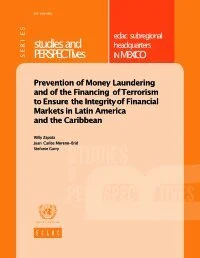Prevention of Money Laundering and of the Financing of Terrorism to Ensure the Integrity of Financial Markets in Latin America and the Caribbean
By Willy Zapata Juan Carlos Moreno-Brid Stefanie Garry.
This paper reviews the current status of the international fight against money laundering and the financing of terrorism, highlighting the importance of its prevention for economic and financial stability in Latin America and the Caribbean. It synthesizes the recent history of international legislation and agreements with respect to the issues, and presents the framework of public and private sector actors engaged in combating these threats. It reviews Latin American and Caribbean countries’ compliance with the Financial Action Task Force (FATF) (40 + 9) Recommendations, and analyzes the region’s performance with respect to their third round Mutual Evaluation Reports. The evidence shows that while the region has made some significant progress in combating various typologies of money laundering and the financing of terrorism, important work remains to be done, particularly with respect to customer due diligence policies and the strengthening of national legal codes. A case study of Mexico’s progress provides specific insight into the country’s reforms and policies to combat these financial sector operational risks. Recent evidence suggests that if Mexico keeps strengthening its commitment to improve national regulatory, legal and judicial systems, it will be able to show full compliance with the FATF Recommendations in future evaluations. The paper provides reflections on new and emerging international threats, especially those related to technological innovations. The authors call for an enhanced system of risk management, technical support to countries, and the design of coordinated international responses to financial crimes and the financing of terrorism to ensure long-term financial sector integrity and macroeconomic stability.
Mexico City: United Nations, 2014. 53p.


